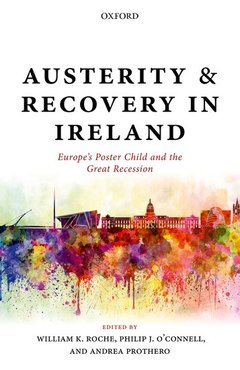Description
Austerity and Recovery in Ireland
Europe's Poster Child and the Great Recession
Coordinators: Roche William K., O'Connell Philip J., Prothero Andrea
Language: English
Subjects for Austerity and Recovery in Ireland:
Austerity and Recovery in Ireland
Publication date: 12-2016
370 p. · 17.2x24.2 cm · Hardback
Publication date: 12-2016
370 p. · 17.2x24.2 cm · Hardback
Austerity and Recovery in Ireland
Publication date: 07-2018
368 p. · 15.6x23.4 cm · Paperback
Publication date: 07-2018
368 p. · 15.6x23.4 cm · Paperback
Description
/li>Biography
/li>
In international commentary and debate on the effects of the Great Recession and austerity, Ireland has been hailed as the poster child for economic recovery and regeneration out of deep economic and fiscal contraction. While the genesis of Ireland's financial, economic, and fiscal crisis has been covered in the literature, no systematic analysis has yet been devoted to the period of austerity, to the impact of austerity on institutions and people, or to the roots of economic recovery. In this book a group of Ireland's leading social scientists present a multidisciplinary analysis of recession and austerity and their effects on economic, business, political, and social life. Individual chapters discuss the fiscal and economic policies implemented, the role of international, and, in particular, of EU institutions, and the effects on businesses, consumption, work, the labour market, migration, political and financial institutions, social inequality and cohesion, housing, and cultural expression. The book shows that Ireland cannot be viewed uncritically as a poster child for austerity. While fiscal contraction provided a basis for stabilizing the perilous finances of the state, economic recovery was due in the main to the long-established structure of Irish economic and business activity, to the importance of foreign direct investment and the dynamic export sector, and to recovery in the international economy. The restructuring and recovery of the financial system was aided by favourable international developments, including historically low interest rates and quantitative easing. Migration flows, nominal wage stability, the protection of social transfer payments, and the involvement of trade unions in severe public sector retrenchment - long-established features of Irish political economy - were of critical importance in the maintenance of social cohesion.
William K. Roche is Professor of Industrial Relations & Human Resources at the College of Business, University College Dublin and Honorary Professor at the Management School, Queen's University, Belfast. He obtained his doctorate from the University of Oxford, where he was Heyworth Memorial Prize Research Fellow of Nuffield College. He has published extensively in leading international peer-reviewed journals in industrial relations and human resource management. His recent books include Managing Conflict at Work: Alternative Dispute Resolution in Ireland (with P. Teague, T. Gormley, and D. Currie, Institute of Public Administration, 2015), The Oxford Handbook of Conflict Management in Organizations (with P. Teague and A. Colvin, OUP, 2014), and Recession at Work: HRM in the Irish Crisis (with P. Teague, A. Coughlan and M. Fahy, Routledge, 2013). Philip J. O'Connell is Professor of Applied Social Science at the School of Social Policy, Social Work and Social Justice at University College Dublin, and Director of the UCD Geary Institute for Public Policy. Most of his work focuses on the labour market and on migration. He has an enduring interest in equality at work and in access to employment, and has published papers on wage inequality, on working conditions and workplace practices, on the transition from unemployment to work, and on the experience of migrant workers in Ireland. He has written several books on the determinants and effects of work-related education and training, and published papers on this and other labour market issues in the leading peer-reviewed journals. He has served as a consultant on human resource development and labour market issues to the European Commission and the OECD. He is a government-appointed member of the Irish Labour Market Council. Andrea Prothero is Professor of Business and Society at the College of Business, University College Dublin. Her research focuses primarily on exploring the relationships between marketing and society,
© 2024 LAVOISIER S.A.S.
These books may interest you

Europe in CrisisBolt from the Blue? 160.25 €



